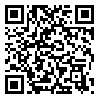Received: 23 Apr ,
2013 Accepted: 25 Jun , 2013
Abstract
Background & Aims: Mood disorders
including major depression (MD) and bipolar mood disorders (BMD) are among the
most frequent psychological problems all over the world. Quality of life (QOL)
is an important endpoint to assess the efficacy of treatment in these two
conditions. This study aimed at evaluating and comparing the QOL in these two
groups in the partial recovery phase with normal counterparts.
Methods & Materials: In the analytic-descriptive cross-sectional setting, 20
patients with MD in partial recovery phase, 20 patients with BMD in partial
recovery phase and 20 healthy subjects were recruited in Tabriz Teaching Razi
Centre in a 6-month period of time. Cases with depression score>18
(according to the Beck depression inventory-2 BDI-2) were excluded. The QOL
was assessed by the (World health organization quality of life
(WHOQOL-BREF) questionnaire.
Results: The three groups were
matched for age and gender. The mean BDI-2 score was significantly higher in
the MD group than that in the two others. The mean score of physical health
domain was significantly lower in the MD group comparing with that in the
controls. The mean score of psychological domain was significantly lower in the
MD group comparing with that in the BMD group. The other scores were comparable
between the three groups.
Conclusion: Based on our findings,
the QOL was lower in the MD group in partial recovery phase in some domains
comparing with the BMD group in the partial recovery phase and the controls. The
QOL was not significantly different between the BMD group in the partial
recovery phase and the controls.
| Rights and permissions | |
 |
This work is licensed under a Creative Commons Attribution-NonCommercial 4.0 International License. |


